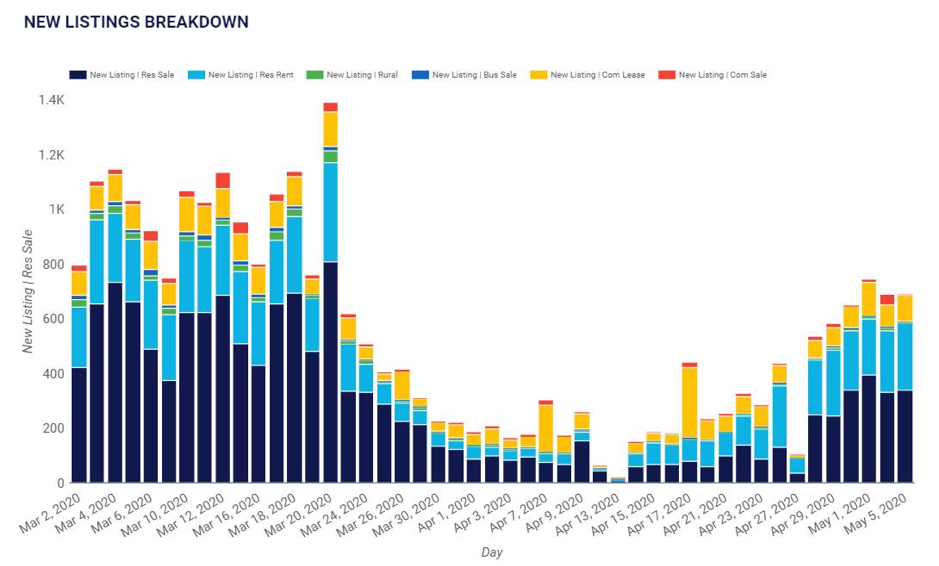After temporary disruption due to COVID-19 pandemic, will the industry see a new normal? New listings pick up during first week of alert level 3 after lockdown slump.
Real-time data from realestate.co.nz shows new property listings slumped during lockdown, but as restrictions were lifted during the first week of alert level 3, so too did the number of new listings being brought to the market.
Vanessa Taylor, realestate.co.nz spokesperson says: “Like many other industries, the property market has been impacted by COVID-19 with the rate of new properties coming onto the market declining during lockdown. But since moving to alert level 3 we’re seeing new listing growth that is encouraging.”
All types of new listings growing during alert level 3
Despite a slowdown in listings during lockdown, the transition to alert level 3 has brought with it the murmurs of a gradual recovery as new listings begin to increase.
Before lockdown, the average number of new daily listings (across all listing types) was 717, but this dropped to an average of 188 during the level 4 lockdown period. While not yet at pre-lockdown levels, in the first week of alert level 3 the average number of daily new listings increased to 508.

Graph excludes weekend data
“There is a lot of speculation around the property market right now, but I’m not convinced that it’s all doom and gloom. We have seen sharp drops followed by gradual recoveries in several overseas markets and there is no reason to believe that New Zealand will be any different,” says Vanessa.
Bindi Norwell, Chief Executive at REINZ says:
“After weeks of only being able to look at properties online, under alert level 3 real estate agents are now able to show two people from an extended bubble through a property in a private viewing. However, Government guidelines have placed a maximum of two viewings per property, per day, so we’d ask people to be patient if there’s a property they’re desperate to see as it may be a few days before an agent can take you through the house.”
“We’re still waiting for sign off on what can happen at level 2, but we believe that open homes will be able to go ahead, albeit with appropriate physical distancing in place.”
Has COVID-19 dampened house prices?
It may be too early to predict what will happen to prices in the coming months, but we will be watching to see if any regional trends emerge.
“The number of government jobs in Wellington might mean more job security, so it will be interesting to see how this impacts buying and selling in the region compared to other parts of the country.”
Data from realestate.co.nz has long shown a supply issue around the country which Vanessa says is prudent to remember when considering the future of the property market.
Property seekers spending more time looking online and are increasingly global
It appears that COVID-19 has not dampened the Kiwi love affair with property. Data from realestate.co.nz shows that users to the site were more engaged during lockdown with average pages per session up by 28% to 8.5 pages and average minutes spent on site up 36% to 8 minutes and 38 seconds*.
Spending more time at home might have been a catalyst increasing activity from property seekers.
“We have been spending more time at home, so we’ve had time to reassess our needs and talk with loved ones about our plans and the implications for where we live.”
This may also be true for those outside of New Zealand. In the first week of May, 23% of all realestate.co.nz’s traffic was from offshore. The hot markets were Australia, the United States and the United Kingdom – countries where we have a large expat community.
For media enquiries, please contact:
Trish Fitzsimons | 021 022 96927 | trish@realestate.co.nz
Glossary of terms:
As the only provider of real estate data in real-time, realestate.co.nz offers valuable property market information not available from other sources.
- Average asking price is not a valuation. It is an indication of current market sentiment. Statistically, asking prices tend to correlate closely with the sales prices recorded in future months when those properties are sold. As it looks at different data, average asking prices may differ from recorded sales data released at the same time.
- Inventory is a measure of how long it would take, theoretically, to sell the current stock at current average rates of sale if no new properties were to be listed for sale. It provides a measure of the rate of turnover in the market.
- New listings are a record of all the new listings on realestate.co.nz for the relevant calendar month. As realestate.co.nz reflects 97% of all properties listed through registered estate agents in New Zealand, this gives a representative view of the New Zealand property market.
- Demand: the increase or decrease in the number of views per listing in that region, taken over a rolling three-month time frame, compared to the same three-month time frame the previous year – including the current month.
- Seasonal adjustment is a method realestate.co.nz uses to better represent the core underlying trend of the property market in New Zealand. This is done using methodology from the New Zealand Institute of Economic Research.
- Truncated mean is the method realestate.co.nz uses to provide statistically relevant asking prices. The top and bottom 10% of listings in each area are removed before the average is calculated, to prevent exceptional listings from providing false impressions.
07 May 2020

